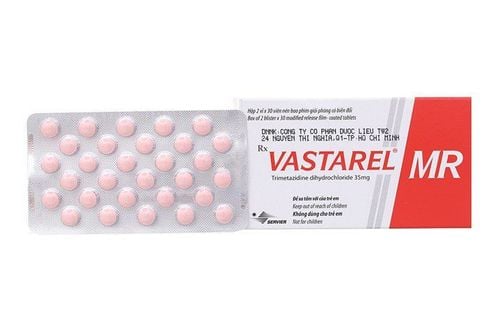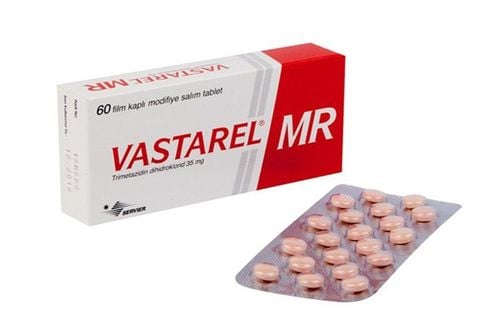Trimetazidine is a drug used to treat angina and is sold under the well-known brand name Vastarel MR. Additionally, Vastarel MR has been shown to have other benefits through clinical trials.
1. What are the benefits of Vastarel MR?
- Relieves angina (prevents myocardial ischemia): Vastarel MR (Trimetazidine) improves the heart muscle's use of glucose by inhibiting the activity of long-chain 3-ketoacyl CoA thiolase, leading to a decrease in fatty acid oxidation and increase of glucose oxidation. The promotion of glucose oxidation optimizes cellular energy processes, thereby maintaining adequate energy metabolism during myocardial ischemia.
- It increases coronary artery blood flow, reduces the rate of angina, decreases blood pressure variability, and does not cause arrhythmias, making it suitable for the prevention of angina.

- Vastarel is not a first-line treatment for angina, especially unstable angina or post-myocardial infarction. It should be used in conjunction with nitrates (Nitroglycerin, isosorbide dinitrate...), which can reduce the dosage of these drugs and thus minimize their side effects.
- Immunomodulation and anticancer effects: In cancer cells, the inhibition of fatty acid oxidation (FAO) changes metabolic processes necessary for tumor cell proliferation, thus inducing Apoptosis in tumor cells. Additionally, Vastarel can inhibit the proliferation of malignancy.
- The drug is also used to treat visual disturbances, dizziness, and tinnitus related to Vascular disease, and to treat Retinal Vascular Diseases
2. Indications and Contraindications
Indications for Vastarel:
- Prevention and supportive care in patients with angina, after myocardial infarction.
- Dizziness caused by vasomotor leads to reduced vision.
- Ophthalmology: Retinal Vascular Diseases
Contraindications for Vastarel:
- Hypersensitivity to Trimetazidine.
- Parkinson's disease.
- Severe renal impairment (Clcr < 30ml/min)
- Pregnancy and lactation.
- Children.
3. Side Effects
In specific cases, Vastarel may cause the following adverse effects:
- Dizziness
- Orthostatic hypotension
- Skin allergies, swelling of the lips and eyes, redness, rash
- Sleep disturbances
- Gastrointestinal disorders: Diarrhea, abdominal pain, dyspepsia, constipation, nausea, vomiting
- Hepatitis
- Headache

4. Dosage of Vastarel (Trimetazidine)
For angina:
- For 20mg tablets: Take 1 tablet 3 times daily with meals.
- For extended-release MR 35mg tablets: Take 2 tablets daily, morning and evening, 12 hours apart. The dosage can be reduced to 2 times daily, 20mg each time.
For ophthalmology and otology: 2-3 tablets (20mg) or 40-60 drops divided into 2-3 doses daily with meals.
For anticancer effects: This is currently under clinical trials and should only be prescribed by an oncologist.
5. Precautions To Consider When Taking Your Drugs
- Inform your doctor about all medications you are currently taking, any previous allergic reactions, pre-existing medical conditions, and your current health status (such as pregnancy, upcoming surgery, etc.).
- Stop taking the medication as directed by your doctor if there is no improvement after 3 months of treatment.
- Use with caution in patients with moderate renal impairment and those over 75 years old.
- Avoid driving or operating heavy machinery.
If you take too much of this medicine or have any side effects, contact your doctor or go to the nearest hospital immediately.

You may also download the MyVinmec app to schedule appointments faster and manage your reservations more conveniently.













